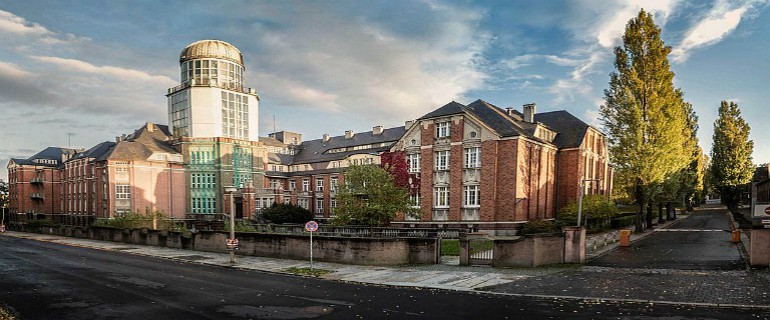
Why Study in Dresden Technical University
The TU Dresden (abbreviated as TUD and often mistakenly translated[a] from German as Dresden University of Technology) is a public research university, the largest institute of higher education in the city of Dresden, the largest university in Saxony and one of the 10 largest universities in Germany with 37,134 students as of 2013.[3] It ranks among the best universities of engineering and technology in Germany.
The name Technische Universität Dresden has only been used since 1961; the history of the university, however, goes back nearly 200 years to 1828. This makes it one of the oldest colleges of technology in Germany, and one of the country’s oldest universities, which in German today refers to institutes of higher education that cover the entire curriculum. The university is a member of TU9, a consortium of the nine leading German Institutes of Technology. The university is one of eleven German universities which succeeded in the Excellence Initiative in 2012, thus getting the title of a "University of Excellence". The TU Dresden succeeded in all three rounds of the German Universities Excellence Initiative (Future Concept, Graduate Schools, Clusters of Excellence).
TU Dresden is a campus university in most aspects. Some of its buildings are more than a hundred years old (such as the buildings around Muenchner Platz square). The architecture of these buildings is mostly influenced by the art nouveau style or the Bauhaus school (e.g. the Chemistry building Fritz-Foerster-Bau). In recent years these historic building have been complemented by modern buildings (e.g. the library, the main auditorium, the biochemistry department or the life sciences building). The main campus, as well as the medical faculty and that of Computer Science, are all within the boundaries of the city of Dresden. The main campus is located South of the city center, mostly in the area bordered by Nöthnitzer Straße, Fritz-Förster-Platz and Münchner Platz; the medical faculty can be found in the Johannstadt district. The faculty of forestry, formerly the Royal Saxon Academy of Forestry, resides in a forest area in the nearby town of Tharandt.
About Dresden Universities
Dresden offers a wide variety of course like medical, engineering, arts, humanities, economics, management through 10 colleges (music, dance, arts, etc), universities (Technical and Applied Science), 2 academies and 12 vocational centres.
Dresden also has a Technical University which is a part of TU9 Universities (TU9 is a association of old, prestigious, largest universities in Germany). Startseite der TU Dresden
Technical Universities also offers Master courses in English to accomodate the International/foreign students. Unfortunately, Bachelors courses are fully in German. One who wishes to learn Bachelors from Germany has to go through intense german languages courses before joining Bachelors.
Studying in Germany - No German? No Problem
Let’s face it -- not everyone goes to study abroad to perfect their language skills. Going for the cultural experience and life in a new place is just as much a factor. Using a study abroad program allows you to tailor a program to fit what you want and make sure that learning in English is a priority.
Finding a program that offers the majority of its courses in English is a great first step. Check out these study abroad opportunities in Germany to find one that meets your language-learning needs. If you’re uncertain, you can ask a question right on the study abroad program page and alumni from that program will answer you.
You can also visit your school’s study abroad office to find out about partner universities in Germany. Often times, North American schools will partner with foreign institutions that specifically offer programming in their native language. It’s not a bad idea either to ask your school if they offer German language courses. Even a semester’s worth of language classes or short summer intensive will go a long way to prepare you for life in Germany. Chances are you might be able to use some of the credits to pad out your degree as well!
Furthermore, many German universities provide different options for varying levels of German-language abilities, including English instruction for absolute beginners.
You can even choose whether to take courses alongside local German students or other international students. With a little extra research, you'll be able to find the perfect program that pairs survival German classes and other subject courses taught with English instruction.
Remember that there is no best option when it comes to choosing a study abroad experience; just choose the best one for you.
For English speakers who aren’t comfortable speaking German except for the occasional “pass the schnitzel” or “Nein!” it’s no problem (or “Kein Problem,” as the Germans would say) for those wanting to study here.
Not only is Germany a hugely cosmopolitan country, with many English services available in its larger cities, but a 2012 survey by the European Commission revealed that 50% of Germans feel comfortable speaking English. In my experience, that number tends to be even higher amongst German youth and students -- the exact people you’ll be interacting with the most during your time studying abroad.
For those students who aren't confident in their German language skills, there are plenty of programs taught in English all over the country. You'll just need to be a little pickier when you're selecting which program in Germany to study abroad with.
Study in germany, universities in germany, top universities in germany, best universities in germany, masters in germany, top business schools in germany, top mba colleges in germany, best mba colleges in germany, mba in germany fees, universities in germany for mba, top ten universities in germany...